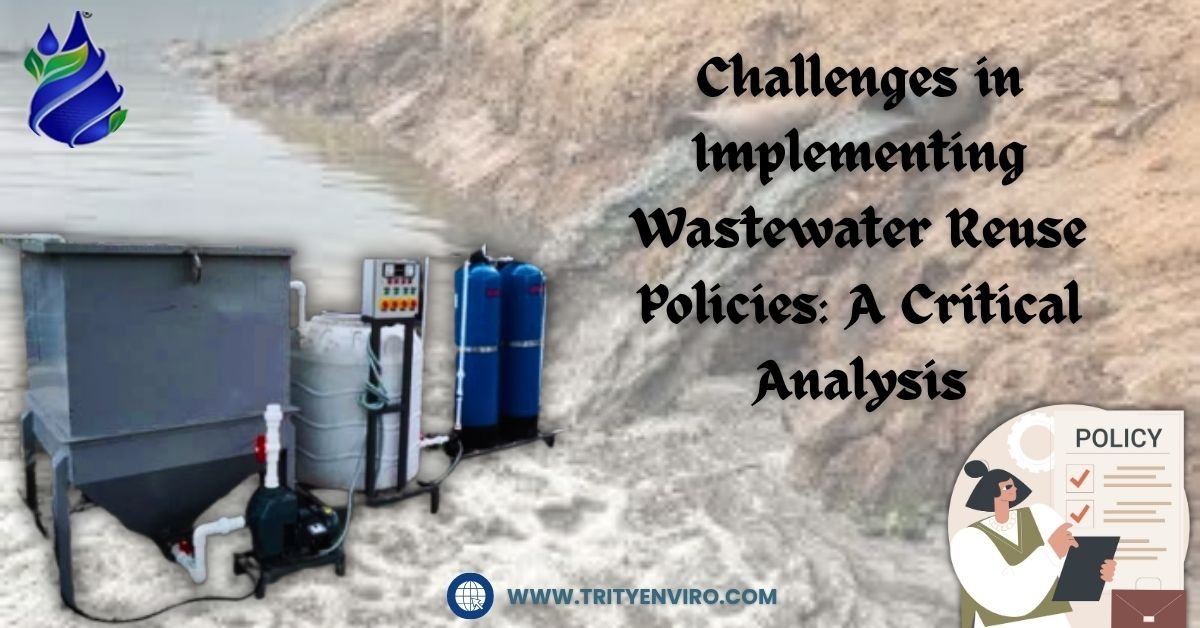
Challenges in Implementing Wastewater Reuse Policies: A Critical Analysis
The problem of water shortage remains a menace to global sustainability targets. The reuse of wastewater is a stable and environmentally friendly solution. Nevertheless, the wastewater reuse policies are hard to realize. Several related challenges are encountered in implementation by the policymakers. These obstacles are critically analysed in this blog so that improved planning and action can take place.
Regulatory and Legal Barriers in Wastewater Reuse Implementation
The world over, governments have come up with wastewater reuse policies. Nevertheless, the existence of inconsistent regulations tends to cause more confusion than certainty. Regulations on water quality vary across states and regions. Several policies are not enforceable, undermining compliance. There is a lack of centralized structure, which brings about duplication of mandates. The environmental, health and municipal departments might fail to coordinate accordingly. Other policies do not specify punishment in case of non-compliance, which limits their effectiveness.
Insufficient legal certainty is one of the reasons why private stakeholders are not eager to invest in reuse technologies. Moreover, certain laws on wastewater reuse do not consider local factors. It leads to unrealistic goals which cannot be achieved by local bodies. Laws will also have to change so that reuse of water becomes compulsory but controlled. The absence of supportive legal frameworks also discourages investment in infrastructure like a sewage treatment plant, which is critical for policy success.
Infrastructure and Technological Limitations in Wastewater Reuse Systems
1. Outdated Infrastructure Limits Capacity- There are a lot of areas that are using ancient sewers. Modern water treatment is not sustainable using these systems. Upgrades require much capital and long-term planning.
2. Lack of Access to Advanced Technology- State-of-the-art water treatment systems are very costly. The developing regions and small towns are not able to afford these systems. This increases the implementation gap.
3. Inadequate Storage and Distribution Systems- Even treated wastewater needs a proper storage. Loss and contamination occur due to poor distribution systems. This decreases the reuse efficiency.
4. Inconsistent Power Supply Affects Plant Operations- Treatment plants that require a lot of energy cannot operate properly without reliable electricity. In the countryside, electricity outages interrupt the reuse cycles.
5. Limited Skilled Workforce- Technicians are required in wastewater treatment plants. These resources are absent in many areas, slowing implementation and not making it easy to maintain.
Public Perception and Social Acceptance Challenges in Wastewater Reuse
The biggest obstacle towards reuse policies is that of the minds of people. The thought of treated sewage water makes a lot of people feel disgusted. This resistance is usually augmented by cultural and religious beliefs. Unawareness of the treated water safety level augments rejection. Even when safety levels are attained in treated wastewater, people have more trust in freshwater. Where the authorities are not able to communicate clearly, misconceptions spread more rapidly.
Media also influences opinion. A single bad report would ruin years of sensitisation. The public campaigns should focus on education and transparency. We need to market the successful case studies more intensively. The success of the policy relies on the support of the people. Industries and municipalities will follow the acceptance of reuse by people. Hence, establishment of trust is equally important as the establishment of infrastructure such as a domestic sewage treatment plant.
Financial and Economic Constraints Hindering Policy Execution
1. High Initial Investment- Wastewater reuse systems need high tech equipment. The initial set up requirements are also expensive and beyond the local governments budgets.
2. Lack of Funding Options- In most regions, there are no special funding patterns regarding water reuse. In absence of government subsidies, the execution becomes slower.
3. Unclear Return on Investment- The profit is always uncertain, which puts off investors of water reuse projects. The payoff is indirect and long term.
4. Operation and Maintenance Costs- Operation of a treatment plant is subject to repeated expenditure. The financial burden goes up by power, chemicals and manpower.
5. Low Water Pricing Discourages Reuse-With cheap or free freshwater, we do not encourage reusing. Proper pricing reforms can resolve this
Institutional and Administrative Gaps in Policy Implementation
The majority of wastewater reuse strategies collapse because of the lack of coordination among departments. There is usually lack of clear responsibility. One department can construct infrastructure, and another department can neglect maintenance. Failure is the result of this lack of synergy. Sometimes the local bodies do not have powers to take decision. They have to wait until someone makes approvals and this causes delays. The process of decision-making is even slower in multi-agency projects.
Fragmentation of policy also leads to overlapping functions resulting to duplication of efforts. Surveillance is also poor. The policies usually miss clear performance measures. In the absence of real-time data, administrators will not be able to monitor the progress or detect the failures. Good governance demands that one nodal agency clearly spells out its responsibilities. There are also lacking training programs on administrative staff. Policymakers and implementers need to be at speed with emerging technologies, especially in areas such as the sludge treatment process. The hour requires institutional strengthening.
Conclusion: How Trity Enviro Solutions Leads the Way
Even though these problems exist, there is hope of change through proper guidance and innovation. Top companies such as Trity Enviro Solutions design advanced, modular, and sustainable wastewater treatment solutions according to the needs of a particular place. Their professional attitude helps to cope with technical and administrative difficulties. By being innovative, quality-driven, and compliant, Trity offers comprehensive solutions that enable the wastewater reuse policies in the most efficient manner. With governments and industries making efforts toward enhancing sustainability, Trity is an assuring ally toward a successful policy execution.


